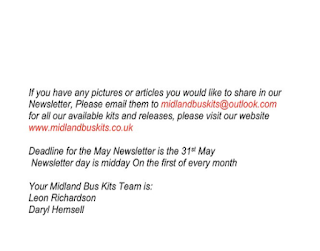Go where you want for £2
As I'm listening to BBC Radio Sheffield's football commentary (Rotherham United vs Blackburn Rovers as part of the marathon 5 hour afternoon coverage) some thoughts come to mind about the Government's £2 maximum fare scheme which a number of real operators are participating in from 1st January to 31st March 2023.
With us being a model operation we have a choice of either joining in or standing on the sidelines going 'we reject this'. Like many Government ideas it is good in principle but like most ideas might fall down in the execution - like the Concessionary Fare scheme which allows free travel for passholders.
 |
| Pushing the 'green' somewhat - our advert |
I don't think anyone can fault the concept of capping bus fares to stimulate bus journeys. It's something which has been tried a number of times in the past and it's proven to generate bus passenger journeys. As part of a battery of measures to alleviate the cost of living crisis in which we find ourselves (obviously an international communist conspiracy*) it can only help.
Government has allocated £60m to this grant scheme - whilst in SWB towers the local mayor of West Yorkshire introduced a £2 cap back in September 2022. To December 2022 that's cost them £3m. Or rather, cost us £3m.
But why is it only in place for three months? Julian Peddle, occasional Buses columnist and someone I have a lot of time for, considers that you need to have this in place for 12 months before you can draw conclusions. Has what happens at the end been considered? Presumably fares revert to the prior level - which will generate negative responses.
I'd argue a similar timeframe exists for a bus route in general. One thing that wound me up at Yellow Buses (now demised) was during 2017 they'd introduce a route, or change one, then be surprised at it's immediate non profitability and than make another change. Despite many bangings of the head on pieces of wood this never registered - why go through with something if you can't fund it for 12 months?
All you achieve is irritated customers, and a workforce as the duties and rosters alter once again.
In my latest MBF Fleet Supplement report, I've touched on the scheme and our participation. The perceived losses from capping the maximum fare will not be as obvious as it normally would be as we heavily discount ticket prices on our bus network. We sell a network in the area we cover. This means we're carrying profitable and unprofitable routes as part of a complete offering that serves every town and village with a basic level of service.
Overall, we're marginally profitable. We have single operator day and period tickets which are set fairly low - the local day ticket is £3 whilst we also sell multi-journey tickets at £5/10 for either 5 or 10 journeys. So on the second ticket option each journey is averaged out at £1 but that ticket doesn't expire until 12 months from issue unlike the first which is either daily, weekly or monthly. So our losses may well stem from the £3 day ticket not being sold.
What is hoped is that additional customers will make up the difference. For an industry which is very much the Cindarella attempts to increase bus passenger journeys are welcome. Hence the sentences in our advert of 'liking what you see and staying with us'.
* = I've assumed you're familiar with the 1960's film 'Dr Strangelove'. If not, you should see it.


Comments
Post a Comment